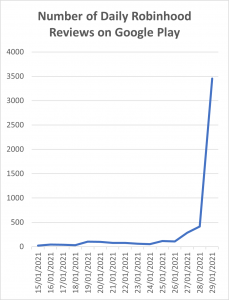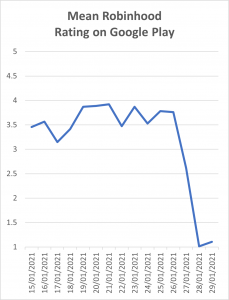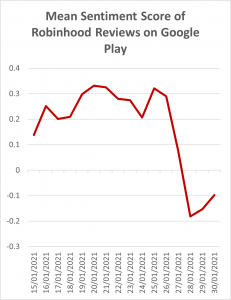
February 1, 2021, by Digital Research
Robinhood and the revenge of the reviewer
Last week saw the share price of the US retailer GameStop rise from US$65 to US$325. This extraordinary jump was fuelled by private investors who have rallied behind the shorted stock, thus pitching themselves against corporate hedge funds.
The narrative of the ‘little man’ battling Wall Street financiers chimed nicely with the name of the app that facilitated much of the share purchasing by individuals: Robinhood.
But when Robinhood temporarily restricted trading of GameStop shares, its users cried foul. Some accused the app of surrendering to hedge fund managers, others filed lawsuits. Still others have attempted to harm the company’s reputation (and profits) by driving down the app’s rating on the Google Play and Apple App Stores.
Although Google has deleted many of the poor ratings and comments, the effects of the ‘review-bombing’ are still visible. As I write, the average rating of the app on Google Play sits at 1.1 (out of 5). You can see below the increase in the number of daily ratings left by users as well as the associated decrease in average score.


The mean rating peaked at 3.92 on the 21st of January, just before the GameStop share price began its meteoric rise. Comments left on that day include:
“Love it. Makes investing easy”
“Love the app experience”
“Well designed for trading”
Skip forward to the 29th of January, however, and the mean rating has dropped to 1.1 out of 5. Comments include:
“They are complicit in market manipulation”
“I can’t believe they stop us from buying stock just because we aren’t millionaires”
“I would give zero stars if possible”
“Steal from the poor and give to the rich”
We can use sentiment analysis on the comments to track the change.
Sentiment analysis describes a range of techniques for quantifying the positivity-negativity of words. Although the methods can struggle to process sarcasm, slang (“they sold my friggin stonks”) or misspelled words (“Thiefffff!”), the techniques are being refined all the time. Some approaches are binary (positive v. negative), while others attribute a sentiment score (e.g. between -5 and 5 for the AFINN ranking, or between 1 and 9 for the labMT lexicon). For our analysis, we used the R package sentimentr to analyse 5000 comments left on Google Play between the 15th and the 29th of January. Sentences such as “I don’t like its business model” score negatively (here, -0.126), whereas sentences such as “Love this app!” score positively (0.433).

The increased negativity of Robinhood app reviews is clear from the graph. On the 28th of January, the mean sentiment score of daily reviews dips into the negative, where it remains.
If you are interested in applying sentiment analysis or other natural language processing techniques in your research, please don’t hesitate to contact a member of the team: https://uniofnottm.sharepoint.com/sites/DigitalResearch/SitePages/Introduction-to-Digital-Research.aspx
Sorry, comments are closed!
